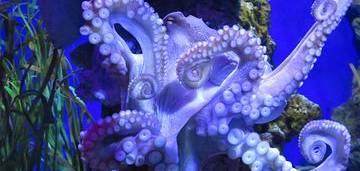
Can cephalopods - octopus, cuttlefish, squid - be farmed sustainably? This seems to be the number one question asked after news surfaced regarding the establishment of Nueva Pescanova’s first commercialized octopus farm in Spain and a potential new Squid farming operation in Japan.
“Sustainable” cephalopod farming does not exist. Sustainable development by definition is to satisfy the demands of current generations without threatening the needs of future generations, while taking economic growth, environmental care, and social well-being into account. Under this principle, cephalopod farming is not sustainable for several reasons.
First, commercial aquaculture is unsustainable by nature. Aquaculture has been touted as a solution to overfishing and food security. However, farming carnivorous species, such as octopus and squid, requires an increase in the extractivism of marine species sourced from strained fisheries using inhumane fishing practices, contributing to a further decrease in already declining populations to acquire the carnivorous diet necessary for these farmed animals.
One study found that the optimal feeding frequency for oval squid is four to five times per day 1. Such practices exacerbate food insecurity issues in communities that could otherwise use those lower-level protein sources, that are rich in nutrients and energy, which are instead fed to farmed species. Furthermore, oval squid (Sepioteuthis lessoniana) and common octopus (Octopus vulgaris) consume live food consisting of crustaceans, which are known to transmit a variety of viral, bacterial, and fungal diseases.
Second, commercial aquaculture farms carry a number of biosecurity and biophysical threats to surrounding environments. In May 2022, the Aquatic Life Institute (ALI) drafted a response to the Environmental Impact of Nueva Pescanova regarding the 1Satjarak, Jirapan, et al. “Optimal Feeding Frequency for Bigfin Reef Squid ( Sepioteuthis Lessoniana ).” Aquaculture Research, vol. 52, no. 6, 29 Jan. 2021, pp. 2740–2750, 10.1111/are.15126. execution of an octopus farm for the Government of the Canary Islands. Many of the biosecurity and biophysical risks that were discussed in this statement also apply to any potential squid farms. A large area of concern that exists at this time is the potential development and rapid spread of unknown pathogens and disease, which could create a substantial public health crisis. Major threats to cephalopod health are water quality issues, physical injury, and infection (due to parasites or other pathogens), all of which may be interrelated. Host-pathogen interactions can be strongly influenced by the environment. Further injuries may be easily inflicted by constrained captive conditions, handling, and transport.
Finally, cephalopod aquaculture farms could have detrimental effects on local aquatic animals either indirectly through unknown contaminants and pollutants transferred through discharge, or directly through farmed and wild aquatic animal interactions made possible by instances of escape. If any escapes were to occur due to human error or natural disasters that harm the integrity of enclosures, then diseases, pathogens, chemicals, etc. could be passed from farmed to wild populations leading to negative interactions with local fauna and a decrease in the genetic integrity of native aquatic animals.
The proposed development of cephalopod farming only casts a spotlight on the collection of concerns connected to these intensive practices. Rather than incentivizing the research and development of aquaculture that could be “efficient and cheap enough” to be commercialized, we should direct investment efforts towards innovative, alternative forms of seafood. From both sustainable and environmental perspectives, cephalopod farming simply should not play a role in global seafood development.
The 97 organizations and scientists that sign this statement strongly believe that government policy must focus on shifting to a global, plant-based food system in an attempt to tackle the dire climate change emergency we are currently facing worldwide. Establishing new, animal factory farms is contrary to United Nations’ 2030 Sustainable Development Goals. Banning these types of farms now, will allow countries to develop in complete alignment with the 2030 SDG commitments moving forward.
Signed by:
Aquatic Life Institute
Africa Network for Animal Welfare USA
Alianima
Anima International
ANIMAL
Animal Advocacy Africa
Animal Empathy Philippines
Animal Equality
Animal Friends Croatia
Animal Justice Canada
Animal Interfaith Alliance
Animal Kingdom Foundation
Animal Law Italia
Animal Nepal
Animal Rights Center Japan
Animals Aotearoa
Animals Australia
Animals Now
Apon Welfare
ARAF-PLATEAU DOGON
ARBA
Arusha Society for the Protection of Animals
Aware
Coalition of African Animal Welfare Organisations
Compassion in World Farming
Conservative Animal Welfare Foundation
Crustacean compassion
The Dark Hobby
Deutscher Tierschutzbund
Dharma Voices for Animals
Dieren Bescherming
Djurens Rätt
Dyrenes Alliance
Education for African Animals Welfare
Essere Animali
Factory Farming Awareness Coalition
Feedback Global
Fish Welfare Initiative
F.R.E.E
Fórum Animal
Friends of Phillip
Ghana Animal Welfare Society
Greek Animal Welfare Fund
Green REV Institute
Humane Africa Trust
The Humane Global Network
The Humane League
The Humane League Mexico
Humánny pokrok
Institute of Animal Law Asia
Invisible Animals (Nevidimi Zhivotni)
Kafessiz Türkiye
L214
Lady Freethinker
Mercy For Animals
National Council of SPCAs
Nurture Imvelo Trust
The Oceans Need Us
Oikeutta eläimille
One Voice
ONG Sante Animale Afrique (SAA)
PACMA
Plataforma ALTO
Planet For All
Protección Animal Ecuador (PAE)
Proveg
Proyecto ALA
PAZ
RENCTAS
SAFCEI
SAFE
Samayu
Sea First
Sentient Media
Shellfish Network
Shrimp Welfare Project
Sibanye Animal Welfare and Conservancy Trust
Sinergia Animal
Sống Thuần Chay
SPCA Montreal
SPCA Selangor
Tanzania Animal Welfare Society (TAWESO)
Tikobane Trust
Tourists Against Trophy Hunting
University of Guilan
Utunzi Animal Welfare Organization
Vegetarianos Hoy
Vissenbescherming
Voiceless
Voices for Animals
Voters for animals rights
We Animals
West Africa Centre for the Protection of Animal Welfare (WACPAW)
WTS
Dr. Becca Franks - New York University
Dr. Andrew Knight, University of Winchester
Dr. Walter Sanchez-Suarez, Mercy For Animals
Posted on 2022-08-30 17:02








Comments